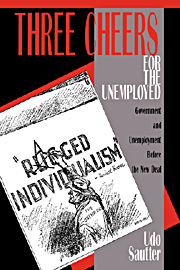Book contents
- Frontmatter
- Contents
- List of figures and tables
- Abbreviations used in the text or footnotes
- Acknowledgments
- Dedication
- 1 Introduction
- 2 Perceiving the problem: 1870s to the entry into World War I
- 3 Nascence and growth of the USES: World War I
- 4 Pondering the issues: Postwar to the mid-1920s
- 5 Accepting the task: 1928–1933
- 6 Epilogue
- Appendix
- Index
2 - Perceiving the problem: 1870s to the entry into World War I
Published online by Cambridge University Press: 31 March 2010
- Frontmatter
- Contents
- List of figures and tables
- Abbreviations used in the text or footnotes
- Acknowledgments
- Dedication
- 1 Introduction
- 2 Perceiving the problem: 1870s to the entry into World War I
- 3 Nascence and growth of the USES: World War I
- 4 Pondering the issues: Postwar to the mid-1920s
- 5 Accepting the task: 1928–1933
- 6 Epilogue
- Appendix
- Index
Summary
The generation before the outbreak of World War I experienced what has been called “the discovery of unemployment.” Joblessness had certainly existed earlier but had been perceived in a different way. In American society throughout most of the nineteenth century the conviction had prevailed that natural laws cannot be tampered with and that consequently government action in the social sphere would ultimately fail. The belief in the merits of competition postulated the individual's self-reliance. By the time of the American entry into the world war, however, a perceptible change had occurred. Although laissez-faire tenets still very much informed governmental behavior toward the jobless, their validity was increasingly being challenged. Advancing industrialization and the concomitant spells of mass unemployment induced reform-oriented thinkers and progressive activists to question the justification of administrative reserve. They laid the seed for future governmental involvement by articulating the problem, devising possible solutions, and broadcasting the need for action. Palpable successes were few as yet, but there could be no doubt that by 1916 a broad public had become acquainted with the issue and governments had grown uneasy about their traditional inertia.
Growing awareness
A new perspective
According to preindustrial convictions, reflected in adherence to the principles of the English Poor Law of 1601 and its modification in 1834, the individual was responsible for his own welfare. It was understood that work was available to those who looked for it, and idleness of employable persons was caused by character deficiencies.
- Type
- Chapter
- Information
- Three Cheers for the UnemployedGovernment and Unemployment before the New Deal, pp. 14 - 120Publisher: Cambridge University PressPrint publication year: 1992

